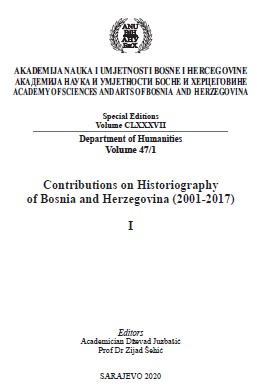Bosna i Hercegovina u antičko doba u kontekstu zapadnobalkanske historiografije u prve dvije decenije 21. stoljeća
Ancient Bosnia and Herzegovina in the context of Western Balkan historiography during the first two decades of the 21st century
Author(s): Amra Šačić Beća
Subject(s): Archaeology, Cultural history, Regional Geography, Historical Geography, Ancient World, Methodology and research technology
Published by: Akademija Nauka i Umjetnosti Bosne i Hercegovine
Keywords: Ancient Bosnia and Herzegovina; Western Balkan historiography; methodology; Rome; Bellum Batonianum; archeology;
Summary/Abstract: The research of ancient history in institutional terms is less represented than other historic periods, which certainly has an impact on the quality and quantity of published papers. We should also bear in mind one specific characteristic of ancient historiography – the difficulty of making a clear distinction between historical and archaeological research of the ancient history of Bosnia and Herzegovina – thus the results of both of these scholarly fields can be observed through the prism of comparability of their themes. A noticeable stagnation in the process of archaeological and historical research is the result of the war of 1992–1995 in Bosnia and Herzegovina. However, the recent period witnessed the birth of a significant number of papers addressing topics such as Roman conquests, peregrine communities (civitates peregrinae), municipal units, and Romanization and urbanization of present-day Bosnia and Herzegovina. We should emphasize that the majority of these papers address the topics from the period of Augustus’s and Tiberius’s reign. The focus is on the study of the position of indigenous communities during the military conflicts with Rome, while the issue of their development following Bellum Batonianum (AD 6–9) is quite neglected. Apart from Slovenian scholar Marjeta Šašel Kos, the first phases of the Roman conquests of the territory of present-day Bosnia and Herzegovina were mostly studied by Croatian scholars – Siniša Bilić-Dujmušić, Danijel Džino, and Marin Zaninović – as part of their wider scope of research during the last two decades. Their research assumes two opposite directions. Firstly, they believe that the conquest of the Adriatic hinterland, i.e. the interior of Illyricum, should be traced through military and political interaction of Rome with individual indigenous communities and polities. Secondly, they believe that the sources are interpreted by tracing the essential political interaction between Rome and the entire regional geopolitical system of Illyricum in order to avoid defining Roman interactions with certain smaller political bodies. In the context of regional historiography regarding Roman conquests, we should single out the papers of already mentioned Danijel Džino. Although his stances frequently part ways with the scholars from Bosnia and Herzegovina, Džino should be acknowledged for making a methodological contribution to the study of the ancient history of Bosnia and Herzegovina through his research.
Book: Prilozi o historiografiji Bosne i Hercegovine (2001–2017) I
- Page Range: 13-54
- Page Count: 42
- Publication Year: 2020
- Language: Bosnian, Croatian, Serbian
- Content File-PDF

